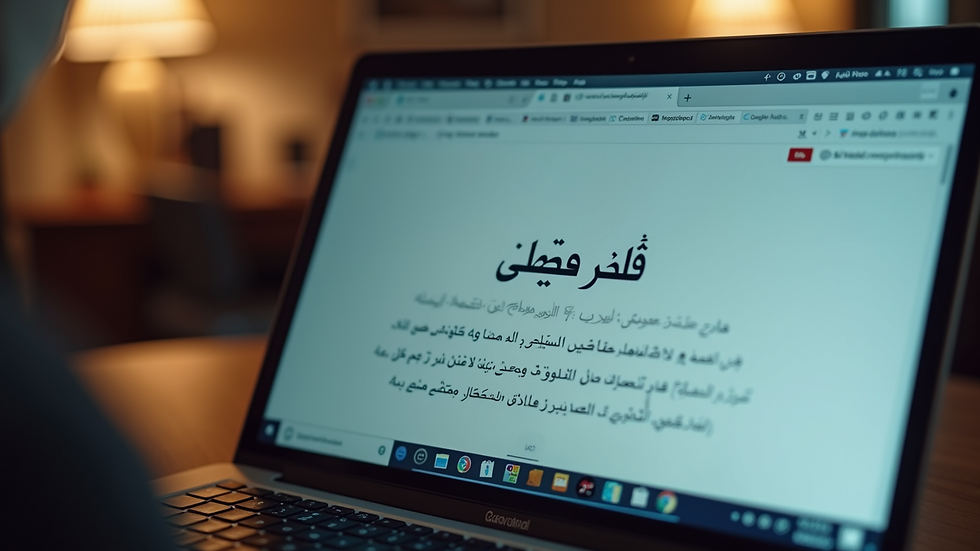Accurate Arabic to English Translation Services
- equitys077
- Sep 17, 2025
- 4 min read
When moving to a new country or working with diverse communities, clear communication is essential. One of the biggest challenges is bridging language gaps, especially between Arabic and English. Arabic is a rich and complex language with many dialects, and translating it accurately into English requires skill and cultural understanding. I want to share insights on why accurate Arabic translations matter, how to get them right, and practical tips for anyone needing this service.
Why Accurate Arabic Translations Matter
Accurate translations are more than just swapping words from one language to another. They ensure that the meaning, tone, and context are preserved. This is especially important for immigrants and refugees who rely on translated documents for legal, medical, educational, and employment purposes. A small mistake in translation can lead to misunderstandings, delays, or even legal issues.
For example, a mistranslated medical report could affect treatment decisions. Similarly, errors in legal documents might cause problems with visas or work permits. That’s why trusted translation services focus on accuracy and cultural sensitivity.
Key reasons to prioritize accuracy:
Legal compliance: Many official documents require certified translations.
Clear communication: Avoid confusion in important conversations.
Cultural respect: Proper translations honor the nuances of both languages.
Better integration: Helps newcomers understand and participate fully in their communities.

How Accurate Arabic Translations Are Achieved
Achieving accuracy in Arabic translations involves several important steps. First, the translator must be fluent in both Arabic and English, with a deep understanding of cultural contexts. Arabic has many dialects, so knowing which one applies is crucial. For example, Modern Standard Arabic is used in formal writing, while spoken dialects vary widely across regions.
Second, professional translators use specialized tools and resources. These include dictionaries, glossaries, and translation software that help maintain consistency. However, human expertise is irreplaceable because machines often miss cultural subtleties.
Third, quality control is essential. This means proofreading and reviewing translations by a second expert to catch errors or awkward phrasing. Some services also offer certified translations, which come with a guarantee of accuracy and are accepted by government agencies.
Tips for ensuring accuracy:
Choose translators with proven experience in Arabic-English work.
Request samples or references to check quality.
Specify the dialect or type of Arabic needed.
Ask about certification if the documents are official.
Provide clear source materials to avoid ambiguity.

How to convert Arabic text to English?
Converting Arabic text to English can be done in several ways, depending on the purpose and complexity of the text. For simple phrases or informal communication, online translation tools can be a quick option. However, these tools often struggle with grammar, idioms, and context, so they are not reliable for official or sensitive documents.
For more accurate results, professional translation services are the best choice. They combine linguistic skills with cultural knowledge to produce clear and faithful translations. Here’s a step-by-step approach to converting Arabic text to English effectively:
Step 1: Identify the type of text - Is it legal, medical, educational, or casual? This affects the style and terminology.
Step 2: Choose the right translator or service - Look for specialists in the relevant field.
Step 3: Provide context - Background information helps translators understand nuances.
Step 4: Review the translation - If possible, have a native English speaker check the final text.
Step 5: Use certified translation for official documents - This ensures acceptance by authorities.
For those seeking reliable arabic to english translation, professional providers like Equity Languages offer tailored services that meet these standards.

Practical Uses of Arabic to English Translation Services
Arabic to English translation services are vital in many real-life situations. Here are some common examples where accurate translations make a difference:
Immigration paperwork: Visa applications, residency permits, and citizenship documents often require certified translations.
Healthcare: Medical records, prescriptions, and patient information must be clearly understood by both patients and providers.
Education: Transcripts, diplomas, and certificates need translation for school admissions or job applications.
Employment: Contracts, job descriptions, and training materials should be accessible to non-Arabic speakers.
Legal matters: Court documents, affidavits, and contracts require precise language to avoid disputes.
By using professional translation services, individuals and organizations can avoid costly mistakes and ensure smooth communication.
Actionable advice:
Always check if your documents need certified translation.
Keep copies of both original and translated documents.
Use translation services that offer confidentiality and data security.
Plan ahead to allow time for translation and review.
Building Bridges with Language Support
Language is a bridge that connects people and communities. Accurate Arabic translations help newcomers feel welcomed and understood. They also empower them to access services, find jobs, and participate fully in society.
Organizations supporting immigrants and refugees can benefit greatly from reliable translation services. They can provide better assistance, reduce misunderstandings, and build trust. This support aligns with the goal of helping individuals achieve their personal and professional goals in their new home.
If you or someone you know needs help with Arabic translations, consider reaching out to trusted providers who specialize in this area. They understand the unique challenges and can offer personalized solutions.
By investing in accurate translations, we create a more inclusive and supportive environment for everyone.
I hope this guide helps you appreciate the importance of accurate Arabic translations and how to approach them effectively. Clear communication opens doors and builds stronger communities. If you want to learn more or need professional assistance, don’t hesitate to explore trusted services that can support your journey.




Comments